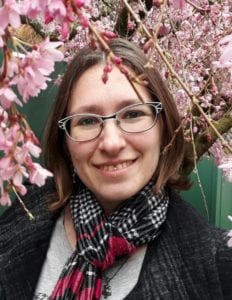
Trainee Author: Alina Kurolap, RN, MSc
PhD Student, Medical Sciences
Technion – Israel Institute of Technology, the Ruth and Bruce Rappaport Faculty of Medicine
(Photo courtesy Kurolap)
This study uses both clinical and mouse studies to identify and describe a distinct human neurological syndrome caused by mutations in SLC6A9, leading to loss of GLYT1, a glycine transporter that regulates extracellular glycine concentration within the central nervous system. This study reported affected individuals who through a combination of whole exome and Sanger sequencing revealed critical variants of SLC6A9 that were not previously identified. The authors explain a parallel Slc6a9-null mouse model that shares similar clinical characteristics.
Although previously characterized neurological syndromes have similar findings, the authors identify that loss of GLYT1 leads to a distinct phenotype. For instance, in their newly identified syndrome, there is an elevation of CSF glycine paired with normal serum glycine. This distinct finding may be later used as a diagnostic marker.
Their results pave new avenues for research in glycine transporters and provide potential improvements for the clinical diagnosis of complex neurological syndromes.
ASHG: Could you describe your research for us?
Ms. Kurolap: My research focuses on deciphering the genetic basis of rare monogenic disorders and understanding how the mutations lead to the observed phenotypes. Our work puts the patients and families at the center, aiming to go from the patient to the laboratory, and back to the patient for a tailored management plan, based on the research results.
ASHG: What are your career goals?
Ms. Kurolap: I hope to find work that combines my clinical skills with the molecular biology knowledge I gained during my graduate studies, whether in a research or a clinical setting.
ASHG: Why did you choose genetics as your field of study?
Ms. Kurolap: Studying rare genetic diseases and understanding how different genetic defects cause different pathologies enable us to learn more about human physiology, which I find fascinating. Genetics is a very fast-evolving field; the more we learn, the more we realize how many mysteries we still need to solve, so there isn’t a dull moment.
ASHG: Describe yourself in three words.
Ms. Kurolap: Diligent, Curious, Thinker.
The Trainee Paper Spotlight highlights outstanding papers written by trainee members of ASHG. Submit your science to be featured, and join the ASHG Trainee Forum to keep up with new ones.
